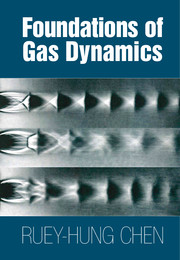Book contents
- Frontmatter
- Contents
- Preface
- 1 Properties and Kinetic Theory of Gases
- 2 Basic Equations and Thermodynamics of Compressible Flow
- 3 Acoustic Wave and Flow Regime
- 4 One-Dimensional Isentropic Flow, Shock, and Expansion Waves
- 5 Steady One-Dimensional Flows in Channels
- 6 One-Dimensional Flows with Friction
- 7 One-Dimensional Flows with Heat Transfer
- 8 Equations of Multidimensional Frictionless Flow Subject to Small Perturbation
- 9 Applications of Small Perturbation Theory
- 10 Method of Characteristics for Two Independent Spatial Variables
- 11 Unsteady One-Dimensional Flows and Nonlinear Waves
- 12 Introduction to Inviscid Hypersonic Flows
- Appendix A Universal Physical Constants
- Appendix B Properties of Some Ideal Gases
- Appendix C Tables for Isentropic and Prandtl-Meyer Expansion Flows
- Appendix D Tables for Normal Shock Waves
- Appendix E Oblique-Shock Chart
- Appendix F Table for Fanno Line Flow
- Appendix G Table for Rayleigh Line Flow
- Bibliography
- Index
1 - Properties and Kinetic Theory of Gases
Published online by Cambridge University Press: 31 March 2017
- Frontmatter
- Contents
- Preface
- 1 Properties and Kinetic Theory of Gases
- 2 Basic Equations and Thermodynamics of Compressible Flow
- 3 Acoustic Wave and Flow Regime
- 4 One-Dimensional Isentropic Flow, Shock, and Expansion Waves
- 5 Steady One-Dimensional Flows in Channels
- 6 One-Dimensional Flows with Friction
- 7 One-Dimensional Flows with Heat Transfer
- 8 Equations of Multidimensional Frictionless Flow Subject to Small Perturbation
- 9 Applications of Small Perturbation Theory
- 10 Method of Characteristics for Two Independent Spatial Variables
- 11 Unsteady One-Dimensional Flows and Nonlinear Waves
- 12 Introduction to Inviscid Hypersonic Flows
- Appendix A Universal Physical Constants
- Appendix B Properties of Some Ideal Gases
- Appendix C Tables for Isentropic and Prandtl-Meyer Expansion Flows
- Appendix D Tables for Normal Shock Waves
- Appendix E Oblique-Shock Chart
- Appendix F Table for Fanno Line Flow
- Appendix G Table for Rayleigh Line Flow
- Bibliography
- Index
Summary
The properties of gases have direct effects on how gases behave as they undergo mechanical or thermal changes. Thermal changes may result from heating due to heat-releasing chemical reactions, such as those taking place in the chemical propellant in rocket chambers, or from aerodynamic heating as on the external surfaces of high-speed flight vehicles or during reentry to the atmosphere. Mechanical changes are associated with processes such as compression (usually accompanied by deceleration in flowing systems) and expansion (usually accompanied by acceleration in flowing systems). These changes usually occur as a consequence of pressure gradients, changes in volume of a given mass, or the existence of body forces arising from gravitational, electrical, or electromagnetic fields. Mechanical and thermal changes may accompany each other, as in the case of isentropic compression/expansion processes or in a constant-volume heating process. They may also take place simultaneously, as in the case of the chemically reacting flow within a rocket chamber, where heating by heat-releasing chemical reactions occur; these chemical reactions can continue through the converging-diverging nozzle, where the flow undergoes expansion and acceleration, and beyond the nozzle exit. Chemical changes are not within the scope of this book, except where it is noted.
The degree with which thermal changes can be measured depends on the properties of the gas. Gas properties are the average quantities of a large number of gas molecules or atoms, which are in a state of constant motion at temperatures above absolute zero. Under normal conditions (i.e., in the macroscopic or “continuum” limit), gas properties can be easily determined experimentally or from thermodynamic considerations. However, in a rarefied gas, with very low density (as one finds under low-pressure conditions such as in the upper atmosphere), such average properties are not readily defined or obtained. It is therefore desirable to look at the behavior and motion of each individual molecule, that is, at the microscopic level. At the microscopic level, one expects the motion of molecules to be influenced by temperature so as to reflect different thermodynamic properties at the macroscopic level. Gas kinetics (or the kinetic theory of gases) is the study of gas molecules at the microscopic level as influenced by temperature. However, kinetic theory can be applied to both rarefied and dense gases, with their macroscopic properties reflecting the collective behavior of individual molecules.
- Type
- Chapter
- Information
- Foundations of Gas Dynamics , pp. 1 - 14Publisher: Cambridge University PressPrint publication year: 2017



